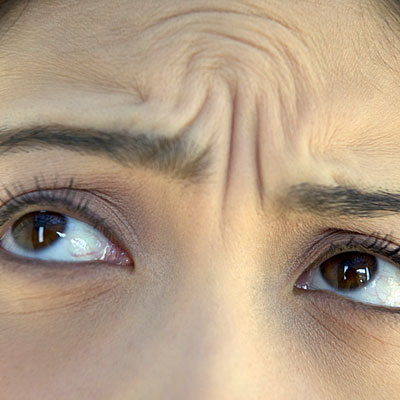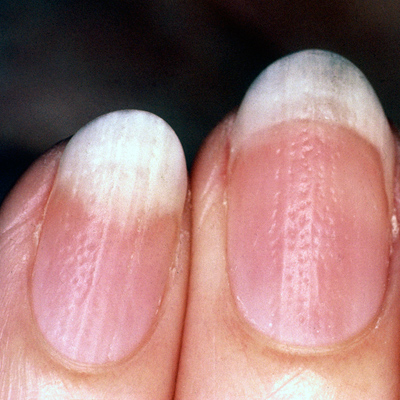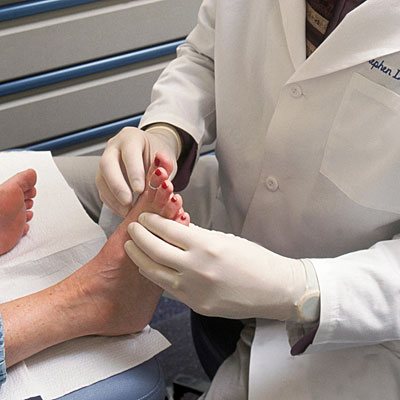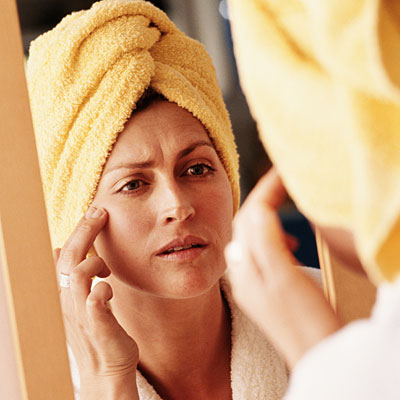
Good looks, good health?
By Karen PallaritoGood health often is reflected in an attractive, youthful appearance. So you might be tempted to blame aging and stress for facial lines, unsightly fingernails, or hair loss when, in fact, these flaws can signal underlying health issues, says integrative medicine specialist Molly M. Roberts, MD, of the Institute for Health & Healing, in San Francisco, and president of the American Holistic Medical Association.
"It'll start by whispering, then it'll start talking, and, if you don't pay attention, it'll start yelling and shouting, and then you've got an illness,” she says.
Here are 13 physical signs that trouble may be lurking beneath the skin's surface.

Wrinkles
Although wrinkles are inevitable, they also may be a sign of osteoporosis.Is your furrowed brow and grooved mouth ratting out your bones? Surprising new research reveals an association between wrinkles and bone health in early-menopausal women.
The worse the wrinkling, the greater the risk of lower bone density. Most wrinkles are the result of aging, but excessive exposure to cigarette smoke or the sun can speed the process.

Swollen feet
Shoes too snug? Many conditions, including sprains, strains, injuries, and infections, can cause feet and ankles to balloon. Pregnancy, obesity, and certain medications may cause fluid retention in the lower extremities.So can certain diseases. If you're one of the 5 million Americans with heart failure, you may be retaining fluid because of your heart’s poor pumping action. Swelling in the legs, ankles, and feet is a classic symptom of this condition.

Pitted nails
If you avoid the manicurist because your nails are a mess, maybe you need to see a doctor. Nails that are pitted, deformed, or discolored (yellow-brown), or nails that thicken or separate from the nail bed, can point to many health problems.Nail changes are common in people with psoriasis, a chronic skin condition; psoriatic arthritis, a related joint condition; and alopecia areata, a type of patchy hair loss.
Pitting has been reported in patients with Reiter’s syndrome, a type of arthritis, and incontinentia pigmenti, a genetic skin condition.

Large hands and feet
You would worry, and rightly so, if a loved one developed a protruding jaw, a prominent forehead, and out-of-proportion hands and feet. All are classic signs of acromegaly, a hormonal disorder that occurs in adults when the pituitary gland makes too much growth hormone.But would you notice the person's change in appearance? Because it's such a rare disorder—and because changes in bone and soft tissue occur slowly over time—it doesn't dawn on people and often goes undetected, says Andrea Utz, MD, PhD, director of the Vanderbilt Pituitary Center at Vanderbilt University Medical Center in Nashville.

A foul mouth
Bad teeth and gums aren't just signs of poor oral hygiene. Your mouth could be saying nasty things about your heart and bones.In 2010, Scottish researchers reporting in the British Medical Journal found that tooth brushing lowers the risk of heart disease. Compared with twice-a-day brushers, people who brushed less frequently had a 70% greater risk of heart disease or death from heart disease. Tooth loss also can signal osteoporosis. Missing teeth may mean jawbone density can no longer support a mouthful of pearly whites.

Facial flush
You might look red in the face, but it's nothing to be embarrassed about. Facial redness with acne-like skin sores are common symptoms of rosacea, a chronic skin condition.Although the exact cause is not known, people with rosacea appear red and flushed in the face due to blood-vessel enlargement. Over time, bumps and pimples may form and the nose may grow bulbous.
http://www.health.com
 11:06 AM
11:06 AM
 About the World
About the World


0 comments:
Post a Comment